International Marketing Case Study Analysis: AusSpritz and Ethics
VerifiedAdded on 2022/12/30
|7
|2226
|97
Case Study
AI Summary
This case study analysis focuses on AusSpritz, a company facing ethical dilemmas related to outsourcing production to Thailand and expanding into the UK market. The analysis identifies ethical issues such as wage inequality, cultural diversity, and the risk of sweatshop environments. It examines consumer behavior in the UK, considering preferences for high-quality products, fair pricing, online shopping, and brand loyalty, alongside the growing importance of corporate social responsibility. The study recommends training for management and employees to address cultural diversity, language barriers, and discrimination. It also suggests CSR activities, efficient marketing strategies, effective pricing, and transparency in production processes to appeal to socially conscious consumers in the UK, ultimately aiming to enhance the company's profitability and brand image. The analysis uses Hofstede's insights to understand cultural dimensions and provides a detailed overview of the marketing challenges and recommendations for AusSpritz.
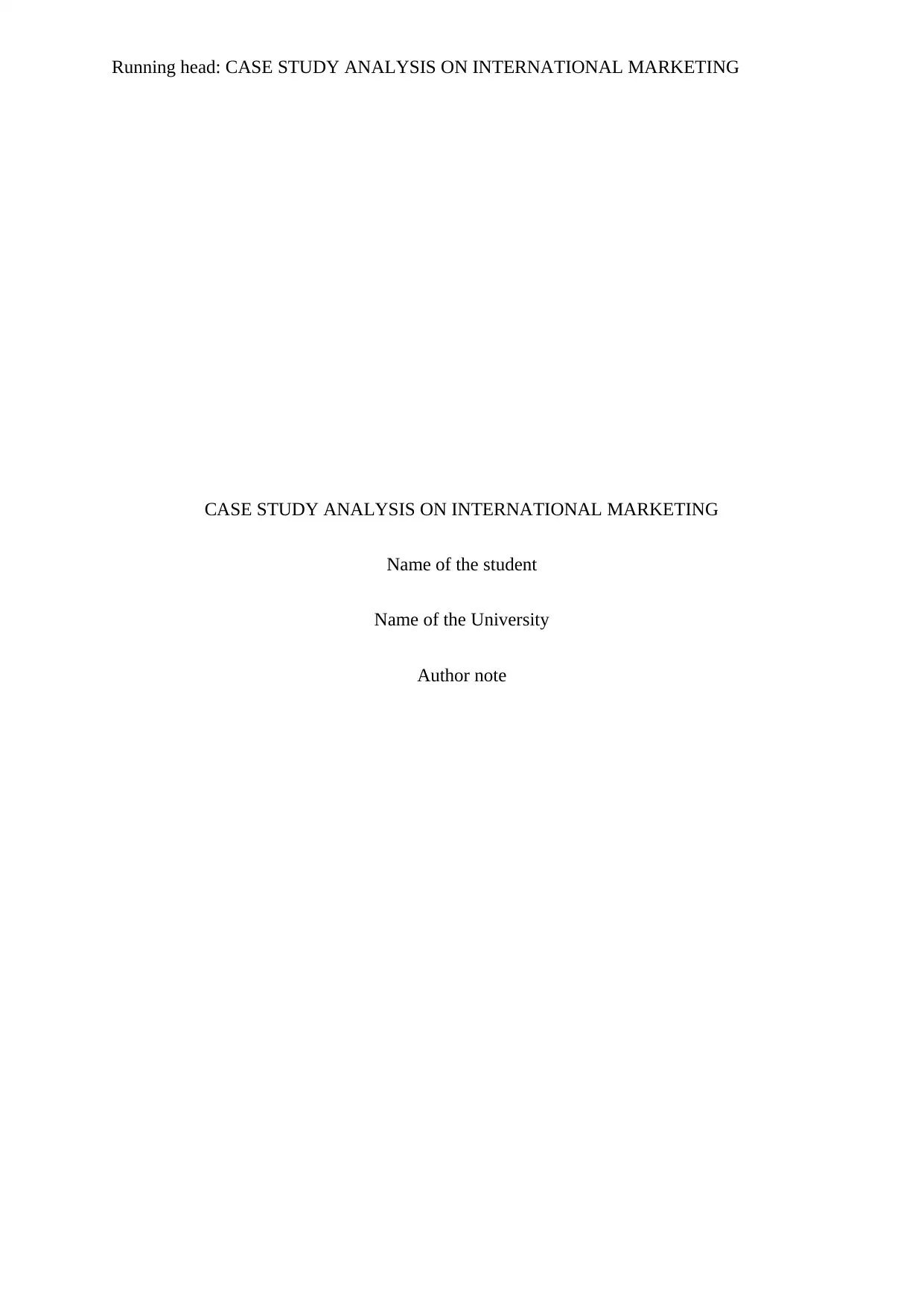
Running head: CASE STUDY ANALYSIS ON INTERNATIONAL MARKETING
CASE STUDY ANALYSIS ON INTERNATIONAL MARKETING
Name of the student
Name of the University
Author note
CASE STUDY ANALYSIS ON INTERNATIONAL MARKETING
Name of the student
Name of the University
Author note
Paraphrase This Document
Need a fresh take? Get an instant paraphrase of this document with our AI Paraphraser
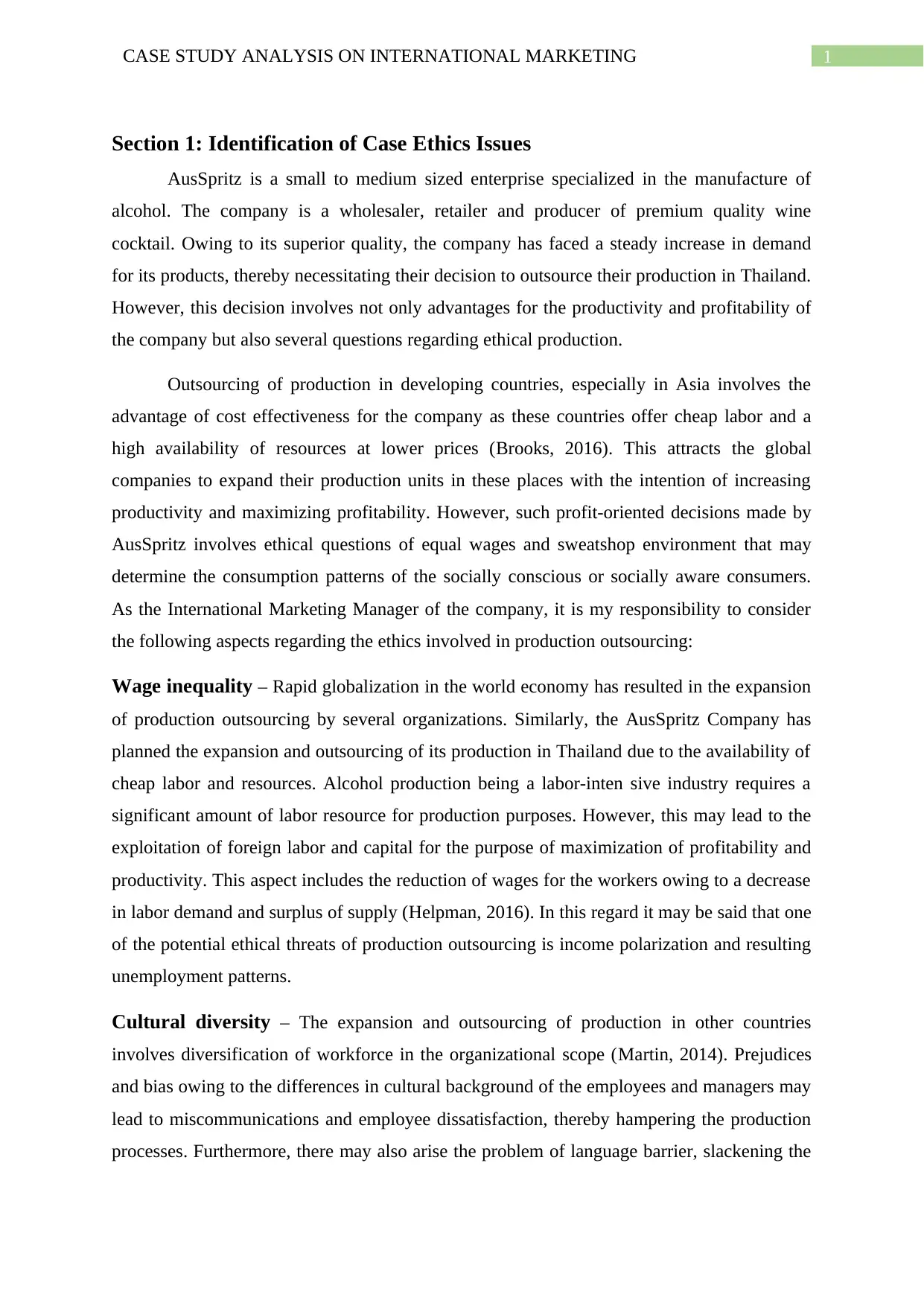
1CASE STUDY ANALYSIS ON INTERNATIONAL MARKETING
Section 1: Identification of Case Ethics Issues
AusSpritz is a small to medium sized enterprise specialized in the manufacture of
alcohol. The company is a wholesaler, retailer and producer of premium quality wine
cocktail. Owing to its superior quality, the company has faced a steady increase in demand
for its products, thereby necessitating their decision to outsource their production in Thailand.
However, this decision involves not only advantages for the productivity and profitability of
the company but also several questions regarding ethical production.
Outsourcing of production in developing countries, especially in Asia involves the
advantage of cost effectiveness for the company as these countries offer cheap labor and a
high availability of resources at lower prices (Brooks, 2016). This attracts the global
companies to expand their production units in these places with the intention of increasing
productivity and maximizing profitability. However, such profit-oriented decisions made by
AusSpritz involves ethical questions of equal wages and sweatshop environment that may
determine the consumption patterns of the socially conscious or socially aware consumers.
As the International Marketing Manager of the company, it is my responsibility to consider
the following aspects regarding the ethics involved in production outsourcing:
Wage inequality – Rapid globalization in the world economy has resulted in the expansion
of production outsourcing by several organizations. Similarly, the AusSpritz Company has
planned the expansion and outsourcing of its production in Thailand due to the availability of
cheap labor and resources. Alcohol production being a labor-inten sive industry requires a
significant amount of labor resource for production purposes. However, this may lead to the
exploitation of foreign labor and capital for the purpose of maximization of profitability and
productivity. This aspect includes the reduction of wages for the workers owing to a decrease
in labor demand and surplus of supply (Helpman, 2016). In this regard it may be said that one
of the potential ethical threats of production outsourcing is income polarization and resulting
unemployment patterns.
Cultural diversity – The expansion and outsourcing of production in other countries
involves diversification of workforce in the organizational scope (Martin, 2014). Prejudices
and bias owing to the differences in cultural background of the employees and managers may
lead to miscommunications and employee dissatisfaction, thereby hampering the production
processes. Furthermore, there may also arise the problem of language barrier, slackening the
Section 1: Identification of Case Ethics Issues
AusSpritz is a small to medium sized enterprise specialized in the manufacture of
alcohol. The company is a wholesaler, retailer and producer of premium quality wine
cocktail. Owing to its superior quality, the company has faced a steady increase in demand
for its products, thereby necessitating their decision to outsource their production in Thailand.
However, this decision involves not only advantages for the productivity and profitability of
the company but also several questions regarding ethical production.
Outsourcing of production in developing countries, especially in Asia involves the
advantage of cost effectiveness for the company as these countries offer cheap labor and a
high availability of resources at lower prices (Brooks, 2016). This attracts the global
companies to expand their production units in these places with the intention of increasing
productivity and maximizing profitability. However, such profit-oriented decisions made by
AusSpritz involves ethical questions of equal wages and sweatshop environment that may
determine the consumption patterns of the socially conscious or socially aware consumers.
As the International Marketing Manager of the company, it is my responsibility to consider
the following aspects regarding the ethics involved in production outsourcing:
Wage inequality – Rapid globalization in the world economy has resulted in the expansion
of production outsourcing by several organizations. Similarly, the AusSpritz Company has
planned the expansion and outsourcing of its production in Thailand due to the availability of
cheap labor and resources. Alcohol production being a labor-inten sive industry requires a
significant amount of labor resource for production purposes. However, this may lead to the
exploitation of foreign labor and capital for the purpose of maximization of profitability and
productivity. This aspect includes the reduction of wages for the workers owing to a decrease
in labor demand and surplus of supply (Helpman, 2016). In this regard it may be said that one
of the potential ethical threats of production outsourcing is income polarization and resulting
unemployment patterns.
Cultural diversity – The expansion and outsourcing of production in other countries
involves diversification of workforce in the organizational scope (Martin, 2014). Prejudices
and bias owing to the differences in cultural background of the employees and managers may
lead to miscommunications and employee dissatisfaction, thereby hampering the production
processes. Furthermore, there may also arise the problem of language barrier, slackening the
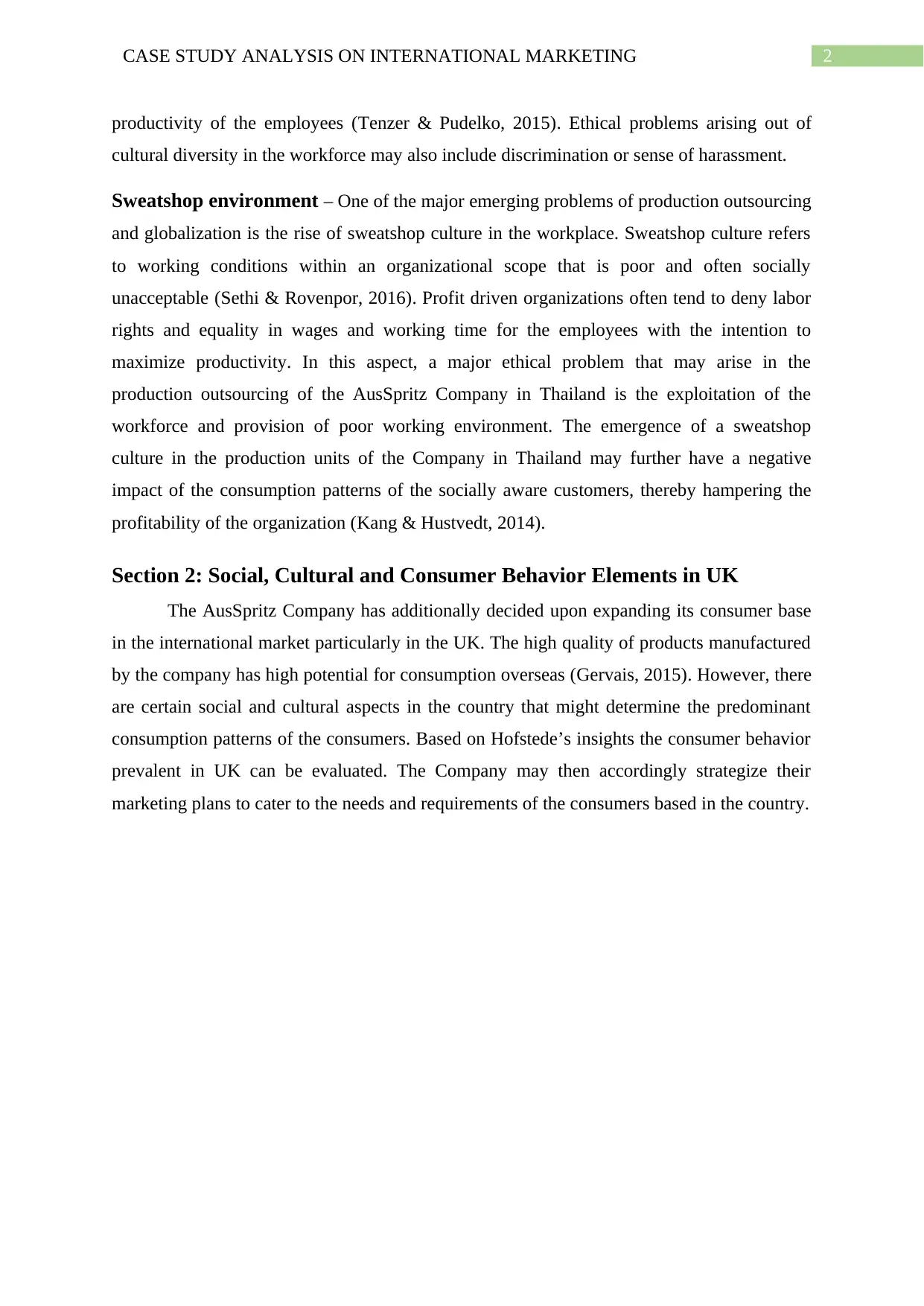
2CASE STUDY ANALYSIS ON INTERNATIONAL MARKETING
productivity of the employees (Tenzer & Pudelko, 2015). Ethical problems arising out of
cultural diversity in the workforce may also include discrimination or sense of harassment.
Sweatshop environment – One of the major emerging problems of production outsourcing
and globalization is the rise of sweatshop culture in the workplace. Sweatshop culture refers
to working conditions within an organizational scope that is poor and often socially
unacceptable (Sethi & Rovenpor, 2016). Profit driven organizations often tend to deny labor
rights and equality in wages and working time for the employees with the intention to
maximize productivity. In this aspect, a major ethical problem that may arise in the
production outsourcing of the AusSpritz Company in Thailand is the exploitation of the
workforce and provision of poor working environment. The emergence of a sweatshop
culture in the production units of the Company in Thailand may further have a negative
impact of the consumption patterns of the socially aware customers, thereby hampering the
profitability of the organization (Kang & Hustvedt, 2014).
Section 2: Social, Cultural and Consumer Behavior Elements in UK
The AusSpritz Company has additionally decided upon expanding its consumer base
in the international market particularly in the UK. The high quality of products manufactured
by the company has high potential for consumption overseas (Gervais, 2015). However, there
are certain social and cultural aspects in the country that might determine the predominant
consumption patterns of the consumers. Based on Hofstede’s insights the consumer behavior
prevalent in UK can be evaluated. The Company may then accordingly strategize their
marketing plans to cater to the needs and requirements of the consumers based in the country.
productivity of the employees (Tenzer & Pudelko, 2015). Ethical problems arising out of
cultural diversity in the workforce may also include discrimination or sense of harassment.
Sweatshop environment – One of the major emerging problems of production outsourcing
and globalization is the rise of sweatshop culture in the workplace. Sweatshop culture refers
to working conditions within an organizational scope that is poor and often socially
unacceptable (Sethi & Rovenpor, 2016). Profit driven organizations often tend to deny labor
rights and equality in wages and working time for the employees with the intention to
maximize productivity. In this aspect, a major ethical problem that may arise in the
production outsourcing of the AusSpritz Company in Thailand is the exploitation of the
workforce and provision of poor working environment. The emergence of a sweatshop
culture in the production units of the Company in Thailand may further have a negative
impact of the consumption patterns of the socially aware customers, thereby hampering the
profitability of the organization (Kang & Hustvedt, 2014).
Section 2: Social, Cultural and Consumer Behavior Elements in UK
The AusSpritz Company has additionally decided upon expanding its consumer base
in the international market particularly in the UK. The high quality of products manufactured
by the company has high potential for consumption overseas (Gervais, 2015). However, there
are certain social and cultural aspects in the country that might determine the predominant
consumption patterns of the consumers. Based on Hofstede’s insights the consumer behavior
prevalent in UK can be evaluated. The Company may then accordingly strategize their
marketing plans to cater to the needs and requirements of the consumers based in the country.
⊘ This is a preview!⊘
Do you want full access?
Subscribe today to unlock all pages.

Trusted by 1+ million students worldwide
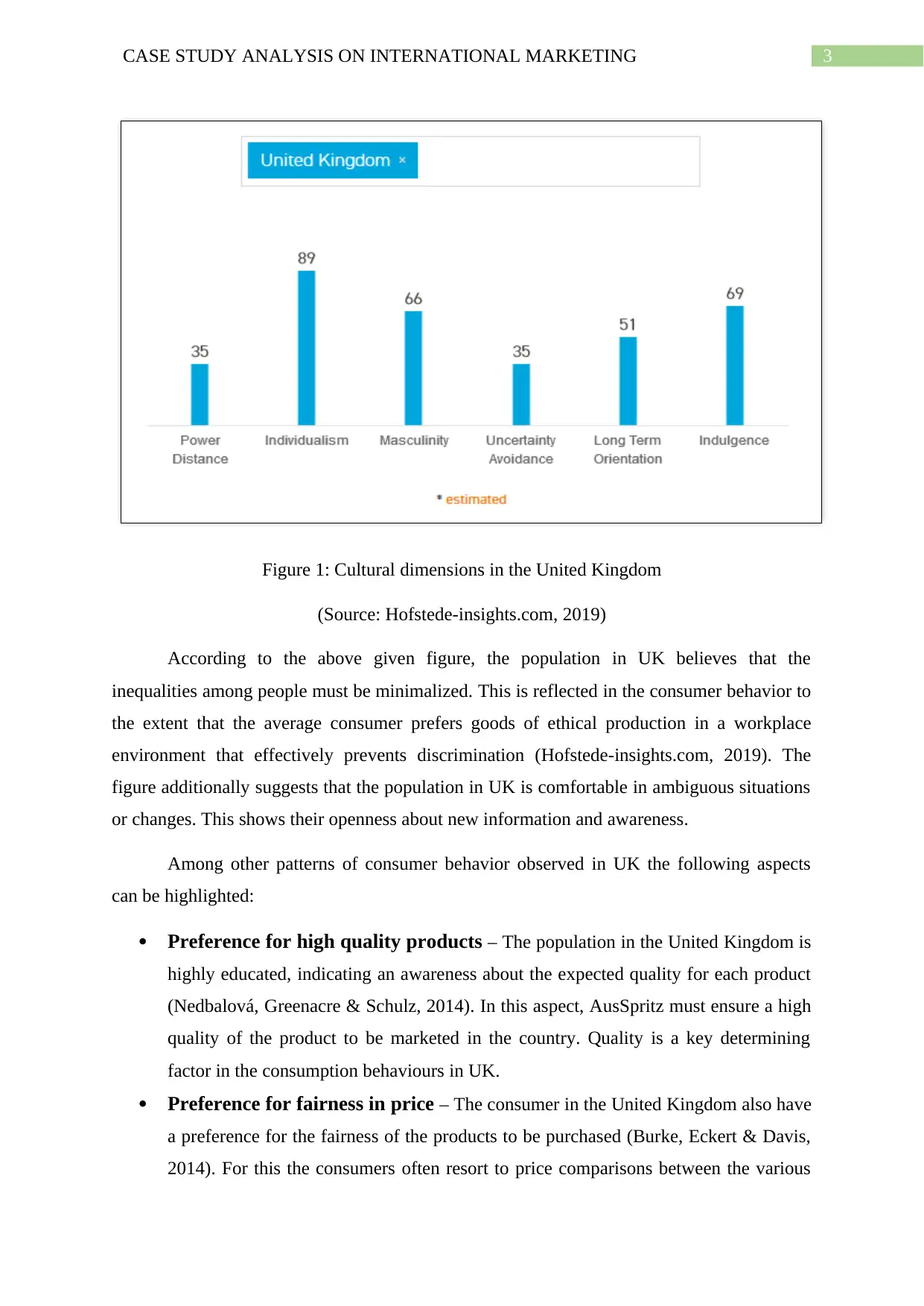
3CASE STUDY ANALYSIS ON INTERNATIONAL MARKETING
Figure 1: Cultural dimensions in the United Kingdom
(Source: Hofstede-insights.com, 2019)
According to the above given figure, the population in UK believes that the
inequalities among people must be minimalized. This is reflected in the consumer behavior to
the extent that the average consumer prefers goods of ethical production in a workplace
environment that effectively prevents discrimination (Hofstede-insights.com, 2019). The
figure additionally suggests that the population in UK is comfortable in ambiguous situations
or changes. This shows their openness about new information and awareness.
Among other patterns of consumer behavior observed in UK the following aspects
can be highlighted:
Preference for high quality products – The population in the United Kingdom is
highly educated, indicating an awareness about the expected quality for each product
(Nedbalová, Greenacre & Schulz, 2014). In this aspect, AusSpritz must ensure a high
quality of the product to be marketed in the country. Quality is a key determining
factor in the consumption behaviours in UK.
Preference for fairness in price – The consumer in the United Kingdom also have
a preference for the fairness of the products to be purchased (Burke, Eckert & Davis,
2014). For this the consumers often resort to price comparisons between the various
Figure 1: Cultural dimensions in the United Kingdom
(Source: Hofstede-insights.com, 2019)
According to the above given figure, the population in UK believes that the
inequalities among people must be minimalized. This is reflected in the consumer behavior to
the extent that the average consumer prefers goods of ethical production in a workplace
environment that effectively prevents discrimination (Hofstede-insights.com, 2019). The
figure additionally suggests that the population in UK is comfortable in ambiguous situations
or changes. This shows their openness about new information and awareness.
Among other patterns of consumer behavior observed in UK the following aspects
can be highlighted:
Preference for high quality products – The population in the United Kingdom is
highly educated, indicating an awareness about the expected quality for each product
(Nedbalová, Greenacre & Schulz, 2014). In this aspect, AusSpritz must ensure a high
quality of the product to be marketed in the country. Quality is a key determining
factor in the consumption behaviours in UK.
Preference for fairness in price – The consumer in the United Kingdom also have
a preference for the fairness of the products to be purchased (Burke, Eckert & Davis,
2014). For this the consumers often resort to price comparisons between the various
Paraphrase This Document
Need a fresh take? Get an instant paraphrase of this document with our AI Paraphraser
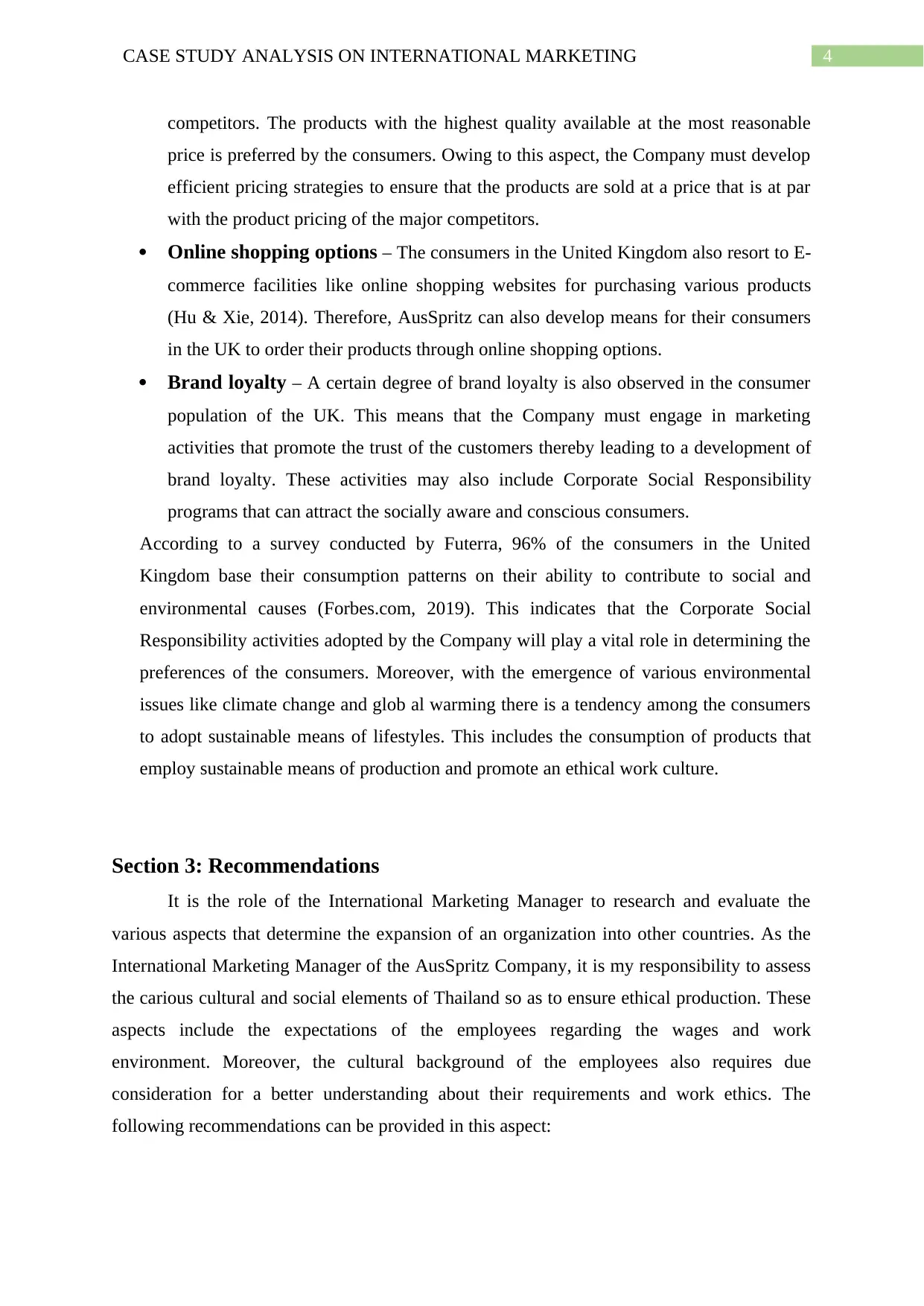
4CASE STUDY ANALYSIS ON INTERNATIONAL MARKETING
competitors. The products with the highest quality available at the most reasonable
price is preferred by the consumers. Owing to this aspect, the Company must develop
efficient pricing strategies to ensure that the products are sold at a price that is at par
with the product pricing of the major competitors.
Online shopping options – The consumers in the United Kingdom also resort to E-
commerce facilities like online shopping websites for purchasing various products
(Hu & Xie, 2014). Therefore, AusSpritz can also develop means for their consumers
in the UK to order their products through online shopping options.
Brand loyalty – A certain degree of brand loyalty is also observed in the consumer
population of the UK. This means that the Company must engage in marketing
activities that promote the trust of the customers thereby leading to a development of
brand loyalty. These activities may also include Corporate Social Responsibility
programs that can attract the socially aware and conscious consumers.
According to a survey conducted by Futerra, 96% of the consumers in the United
Kingdom base their consumption patterns on their ability to contribute to social and
environmental causes (Forbes.com, 2019). This indicates that the Corporate Social
Responsibility activities adopted by the Company will play a vital role in determining the
preferences of the consumers. Moreover, with the emergence of various environmental
issues like climate change and glob al warming there is a tendency among the consumers
to adopt sustainable means of lifestyles. This includes the consumption of products that
employ sustainable means of production and promote an ethical work culture.
Section 3: Recommendations
It is the role of the International Marketing Manager to research and evaluate the
various aspects that determine the expansion of an organization into other countries. As the
International Marketing Manager of the AusSpritz Company, it is my responsibility to assess
the carious cultural and social elements of Thailand so as to ensure ethical production. These
aspects include the expectations of the employees regarding the wages and work
environment. Moreover, the cultural background of the employees also requires due
consideration for a better understanding about their requirements and work ethics. The
following recommendations can be provided in this aspect:
competitors. The products with the highest quality available at the most reasonable
price is preferred by the consumers. Owing to this aspect, the Company must develop
efficient pricing strategies to ensure that the products are sold at a price that is at par
with the product pricing of the major competitors.
Online shopping options – The consumers in the United Kingdom also resort to E-
commerce facilities like online shopping websites for purchasing various products
(Hu & Xie, 2014). Therefore, AusSpritz can also develop means for their consumers
in the UK to order their products through online shopping options.
Brand loyalty – A certain degree of brand loyalty is also observed in the consumer
population of the UK. This means that the Company must engage in marketing
activities that promote the trust of the customers thereby leading to a development of
brand loyalty. These activities may also include Corporate Social Responsibility
programs that can attract the socially aware and conscious consumers.
According to a survey conducted by Futerra, 96% of the consumers in the United
Kingdom base their consumption patterns on their ability to contribute to social and
environmental causes (Forbes.com, 2019). This indicates that the Corporate Social
Responsibility activities adopted by the Company will play a vital role in determining the
preferences of the consumers. Moreover, with the emergence of various environmental
issues like climate change and glob al warming there is a tendency among the consumers
to adopt sustainable means of lifestyles. This includes the consumption of products that
employ sustainable means of production and promote an ethical work culture.
Section 3: Recommendations
It is the role of the International Marketing Manager to research and evaluate the
various aspects that determine the expansion of an organization into other countries. As the
International Marketing Manager of the AusSpritz Company, it is my responsibility to assess
the carious cultural and social elements of Thailand so as to ensure ethical production. These
aspects include the expectations of the employees regarding the wages and work
environment. Moreover, the cultural background of the employees also requires due
consideration for a better understanding about their requirements and work ethics. The
following recommendations can be provided in this aspect:
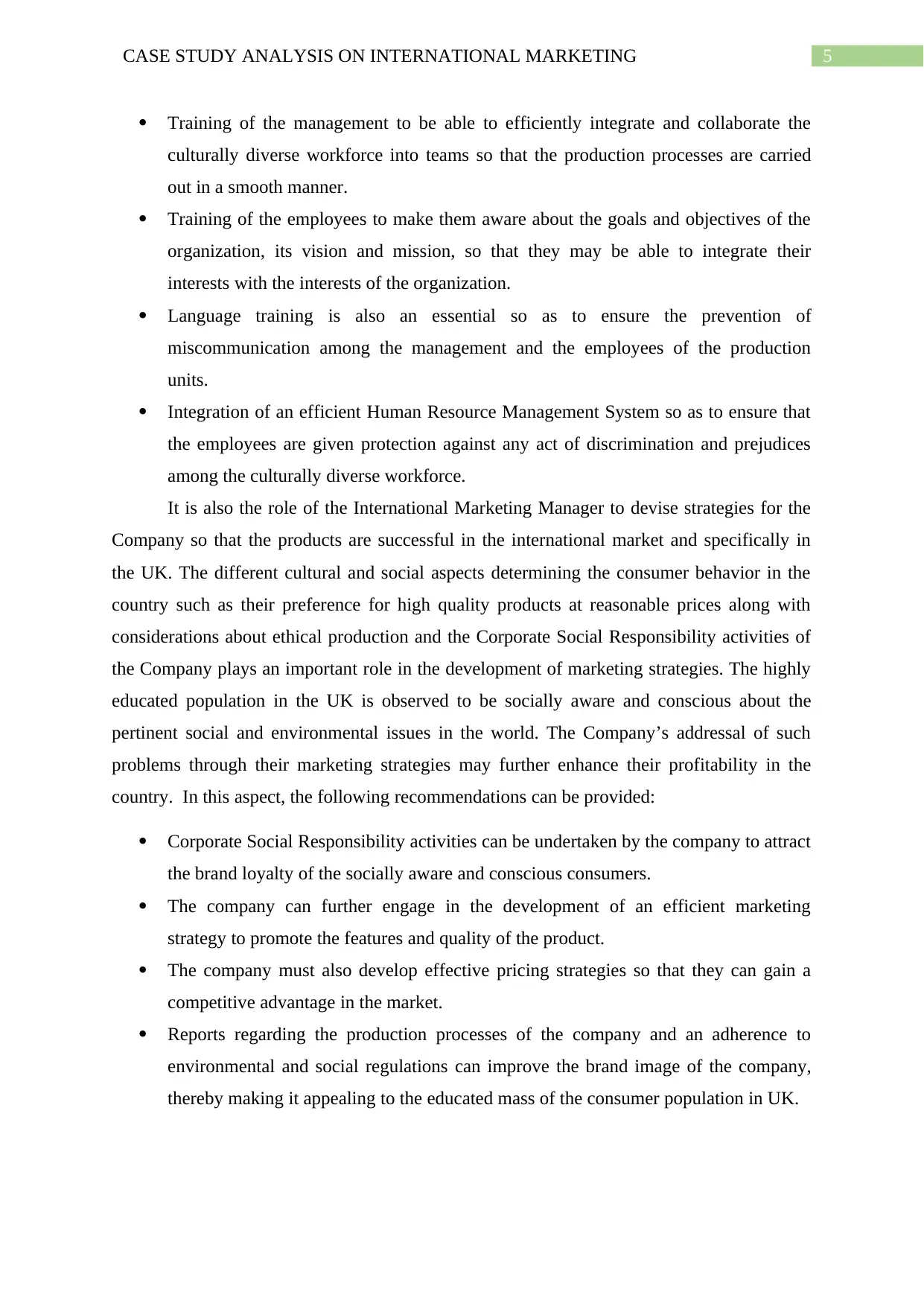
5CASE STUDY ANALYSIS ON INTERNATIONAL MARKETING
Training of the management to be able to efficiently integrate and collaborate the
culturally diverse workforce into teams so that the production processes are carried
out in a smooth manner.
Training of the employees to make them aware about the goals and objectives of the
organization, its vision and mission, so that they may be able to integrate their
interests with the interests of the organization.
Language training is also an essential so as to ensure the prevention of
miscommunication among the management and the employees of the production
units.
Integration of an efficient Human Resource Management System so as to ensure that
the employees are given protection against any act of discrimination and prejudices
among the culturally diverse workforce.
It is also the role of the International Marketing Manager to devise strategies for the
Company so that the products are successful in the international market and specifically in
the UK. The different cultural and social aspects determining the consumer behavior in the
country such as their preference for high quality products at reasonable prices along with
considerations about ethical production and the Corporate Social Responsibility activities of
the Company plays an important role in the development of marketing strategies. The highly
educated population in the UK is observed to be socially aware and conscious about the
pertinent social and environmental issues in the world. The Company’s addressal of such
problems through their marketing strategies may further enhance their profitability in the
country. In this aspect, the following recommendations can be provided:
Corporate Social Responsibility activities can be undertaken by the company to attract
the brand loyalty of the socially aware and conscious consumers.
The company can further engage in the development of an efficient marketing
strategy to promote the features and quality of the product.
The company must also develop effective pricing strategies so that they can gain a
competitive advantage in the market.
Reports regarding the production processes of the company and an adherence to
environmental and social regulations can improve the brand image of the company,
thereby making it appealing to the educated mass of the consumer population in UK.
Training of the management to be able to efficiently integrate and collaborate the
culturally diverse workforce into teams so that the production processes are carried
out in a smooth manner.
Training of the employees to make them aware about the goals and objectives of the
organization, its vision and mission, so that they may be able to integrate their
interests with the interests of the organization.
Language training is also an essential so as to ensure the prevention of
miscommunication among the management and the employees of the production
units.
Integration of an efficient Human Resource Management System so as to ensure that
the employees are given protection against any act of discrimination and prejudices
among the culturally diverse workforce.
It is also the role of the International Marketing Manager to devise strategies for the
Company so that the products are successful in the international market and specifically in
the UK. The different cultural and social aspects determining the consumer behavior in the
country such as their preference for high quality products at reasonable prices along with
considerations about ethical production and the Corporate Social Responsibility activities of
the Company plays an important role in the development of marketing strategies. The highly
educated population in the UK is observed to be socially aware and conscious about the
pertinent social and environmental issues in the world. The Company’s addressal of such
problems through their marketing strategies may further enhance their profitability in the
country. In this aspect, the following recommendations can be provided:
Corporate Social Responsibility activities can be undertaken by the company to attract
the brand loyalty of the socially aware and conscious consumers.
The company can further engage in the development of an efficient marketing
strategy to promote the features and quality of the product.
The company must also develop effective pricing strategies so that they can gain a
competitive advantage in the market.
Reports regarding the production processes of the company and an adherence to
environmental and social regulations can improve the brand image of the company,
thereby making it appealing to the educated mass of the consumer population in UK.
⊘ This is a preview!⊘
Do you want full access?
Subscribe today to unlock all pages.

Trusted by 1+ million students worldwide
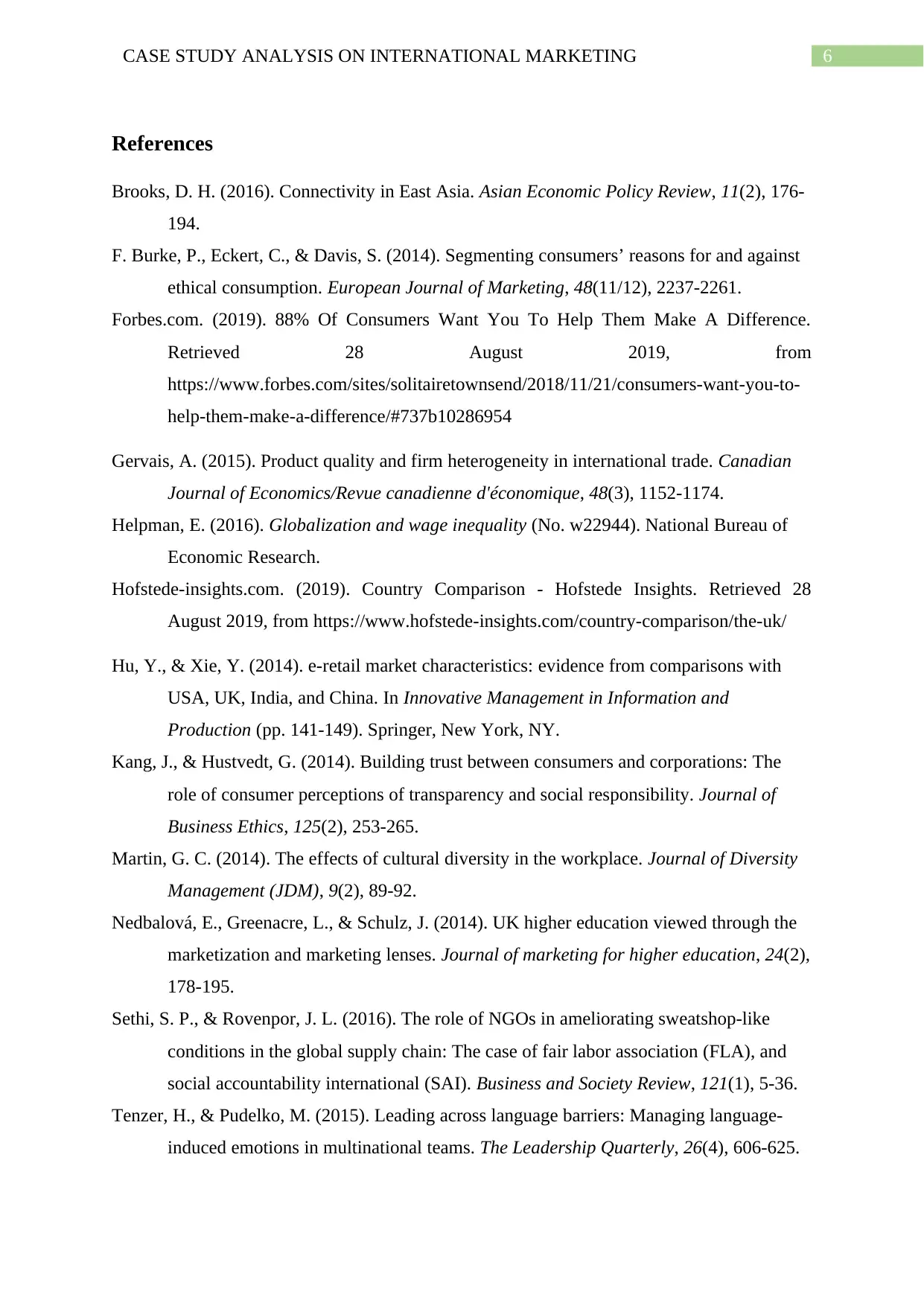
6CASE STUDY ANALYSIS ON INTERNATIONAL MARKETING
References
Brooks, D. H. (2016). Connectivity in East Asia. Asian Economic Policy Review, 11(2), 176-
194.
F. Burke, P., Eckert, C., & Davis, S. (2014). Segmenting consumers’ reasons for and against
ethical consumption. European Journal of Marketing, 48(11/12), 2237-2261.
Forbes.com. (2019). 88% Of Consumers Want You To Help Them Make A Difference.
Retrieved 28 August 2019, from
https://www.forbes.com/sites/solitairetownsend/2018/11/21/consumers-want-you-to-
help-them-make-a-difference/#737b10286954
Gervais, A. (2015). Product quality and firm heterogeneity in international trade. Canadian
Journal of Economics/Revue canadienne d'économique, 48(3), 1152-1174.
Helpman, E. (2016). Globalization and wage inequality (No. w22944). National Bureau of
Economic Research.
Hofstede-insights.com. (2019). Country Comparison - Hofstede Insights. Retrieved 28
August 2019, from https://www.hofstede-insights.com/country-comparison/the-uk/
Hu, Y., & Xie, Y. (2014). e-retail market characteristics: evidence from comparisons with
USA, UK, India, and China. In Innovative Management in Information and
Production (pp. 141-149). Springer, New York, NY.
Kang, J., & Hustvedt, G. (2014). Building trust between consumers and corporations: The
role of consumer perceptions of transparency and social responsibility. Journal of
Business Ethics, 125(2), 253-265.
Martin, G. C. (2014). The effects of cultural diversity in the workplace. Journal of Diversity
Management (JDM), 9(2), 89-92.
Nedbalová, E., Greenacre, L., & Schulz, J. (2014). UK higher education viewed through the
marketization and marketing lenses. Journal of marketing for higher education, 24(2),
178-195.
Sethi, S. P., & Rovenpor, J. L. (2016). The role of NGOs in ameliorating sweatshop‐like
conditions in the global supply chain: The case of fair labor association (FLA), and
social accountability international (SAI). Business and Society Review, 121(1), 5-36.
Tenzer, H., & Pudelko, M. (2015). Leading across language barriers: Managing language-
induced emotions in multinational teams. The Leadership Quarterly, 26(4), 606-625.
References
Brooks, D. H. (2016). Connectivity in East Asia. Asian Economic Policy Review, 11(2), 176-
194.
F. Burke, P., Eckert, C., & Davis, S. (2014). Segmenting consumers’ reasons for and against
ethical consumption. European Journal of Marketing, 48(11/12), 2237-2261.
Forbes.com. (2019). 88% Of Consumers Want You To Help Them Make A Difference.
Retrieved 28 August 2019, from
https://www.forbes.com/sites/solitairetownsend/2018/11/21/consumers-want-you-to-
help-them-make-a-difference/#737b10286954
Gervais, A. (2015). Product quality and firm heterogeneity in international trade. Canadian
Journal of Economics/Revue canadienne d'économique, 48(3), 1152-1174.
Helpman, E. (2016). Globalization and wage inequality (No. w22944). National Bureau of
Economic Research.
Hofstede-insights.com. (2019). Country Comparison - Hofstede Insights. Retrieved 28
August 2019, from https://www.hofstede-insights.com/country-comparison/the-uk/
Hu, Y., & Xie, Y. (2014). e-retail market characteristics: evidence from comparisons with
USA, UK, India, and China. In Innovative Management in Information and
Production (pp. 141-149). Springer, New York, NY.
Kang, J., & Hustvedt, G. (2014). Building trust between consumers and corporations: The
role of consumer perceptions of transparency and social responsibility. Journal of
Business Ethics, 125(2), 253-265.
Martin, G. C. (2014). The effects of cultural diversity in the workplace. Journal of Diversity
Management (JDM), 9(2), 89-92.
Nedbalová, E., Greenacre, L., & Schulz, J. (2014). UK higher education viewed through the
marketization and marketing lenses. Journal of marketing for higher education, 24(2),
178-195.
Sethi, S. P., & Rovenpor, J. L. (2016). The role of NGOs in ameliorating sweatshop‐like
conditions in the global supply chain: The case of fair labor association (FLA), and
social accountability international (SAI). Business and Society Review, 121(1), 5-36.
Tenzer, H., & Pudelko, M. (2015). Leading across language barriers: Managing language-
induced emotions in multinational teams. The Leadership Quarterly, 26(4), 606-625.
1 out of 7
Related Documents
Your All-in-One AI-Powered Toolkit for Academic Success.
+13062052269
info@desklib.com
Available 24*7 on WhatsApp / Email
![[object Object]](/_next/static/media/star-bottom.7253800d.svg)
Unlock your academic potential
Copyright © 2020–2026 A2Z Services. All Rights Reserved. Developed and managed by ZUCOL.




